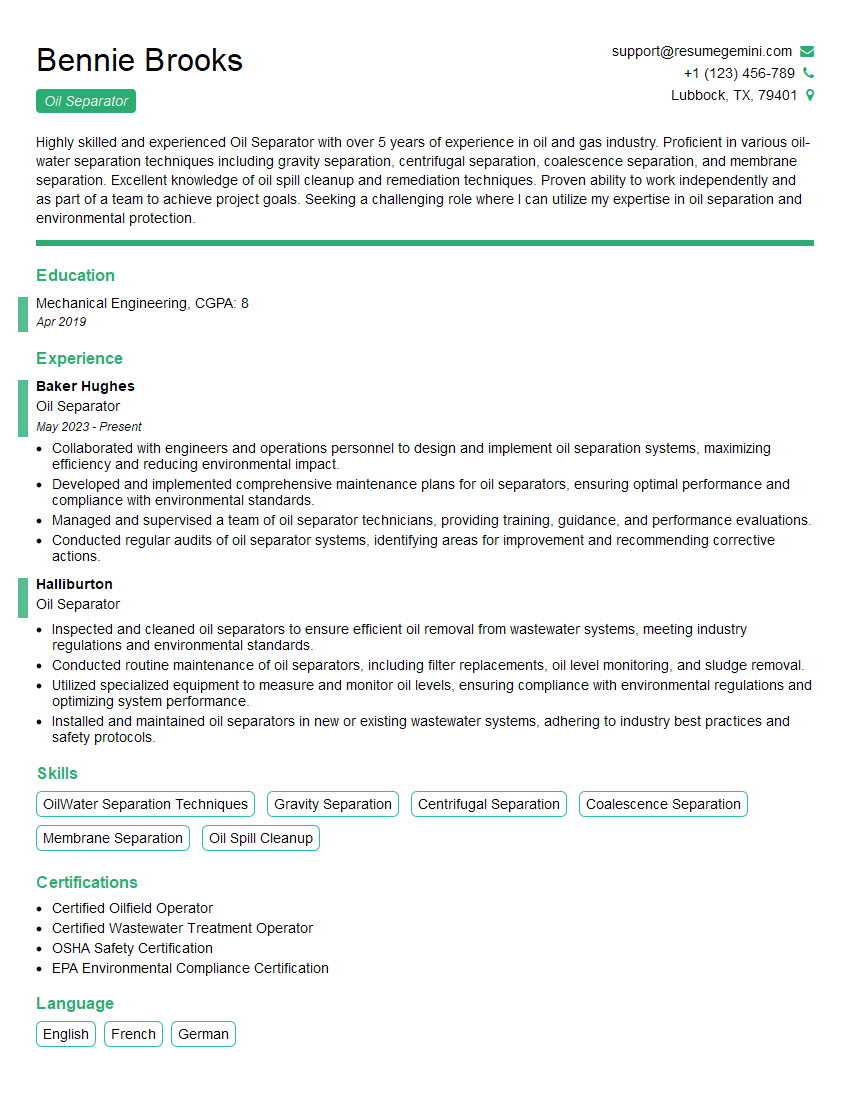Are you a seasoned Oil Separator seeking a new career path? Discover our professionally built Oil Separator Resume Template. This time-saving tool provides a solid foundation for your job search. Simply click “Edit Resume” to customize it with your unique experiences and achievements. Customize fonts and colors to match your personal style and increase your chances of landing your dream job. Explore more Resume Templates for additional options.

Bennie Brooks
Oil Separator
Summary
Highly skilled and experienced Oil Separator with over 5 years of experience in oil and gas industry. Proficient in various oil-water separation techniques including gravity separation, centrifugal separation, coalescence separation, and membrane separation. Excellent knowledge of oil spill cleanup and remediation techniques. Proven ability to work independently and as part of a team to achieve project goals. Seeking a challenging role where I can utilize my expertise in oil separation and environmental protection.
Education
Mechanical Engineering
April 2019
Skills
- OilWater Separation Techniques
- Gravity Separation
- Centrifugal Separation
- Coalescence Separation
- Membrane Separation
- Oil Spill Cleanup
Work Experience
Oil Separator
- Collaborated with engineers and operations personnel to design and implement oil separation systems, maximizing efficiency and reducing environmental impact.
- Developed and implemented comprehensive maintenance plans for oil separators, ensuring optimal performance and compliance with environmental standards.
- Managed and supervised a team of oil separator technicians, providing training, guidance, and performance evaluations.
- Conducted regular audits of oil separator systems, identifying areas for improvement and recommending corrective actions.
Oil Separator
- Inspected and cleaned oil separators to ensure efficient oil removal from wastewater systems, meeting industry regulations and environmental standards.
- Conducted routine maintenance of oil separators, including filter replacements, oil level monitoring, and sludge removal.
- Utilized specialized equipment to measure and monitor oil levels, ensuring compliance with environmental regulations and optimizing system performance.
- Installed and maintained oil separators in new or existing wastewater systems, adhering to industry best practices and safety protocols.
Certificates
- Certified Oilfield Operator
- Certified Wastewater Treatment Operator
- OSHA Safety Certification
- EPA Environmental Compliance Certification
Languages
- English
- French
- German
Career Expert Tips:
- Select the ideal resume template to showcase your professional experience effectively.
- Master the art of resume writing to highlight your unique qualifications and achievements.
- Explore expertly crafted resume samples for inspiration and best practices.
- Build your best resume for free this new year with ResumeGemini. Enjoy exclusive discounts on ATS optimized resume templates.
How To Write Resume For Oil Separator
- Quantify your accomplishments whenever possible, using specific metrics to demonstrate your impact.
- Highlight your experience with different oil-water separation techniques and your ability to troubleshoot and resolve issues.
- Emphasize your commitment to safety and environmental protection.
- Consider including a section on your resume that showcases your knowledge of oil spill cleanup and remediation.
- Proofread your resume carefully before submitting it to ensure there are no errors.
Essential Experience Highlights for a Strong Oil Separator Resume
- Operate and maintain oil separation equipment to ensure efficient operation and compliance with environmental regulations.
- Monitor oil-water separation processes and make adjustments as needed to optimize performance.
- Conduct routine inspections and maintenance of equipment to prevent breakdowns and ensure safety.
- Troubleshoot and resolve issues with oil separation systems to minimize downtime.
- Collect and analyze data on oil-water separation performance to identify areas for improvement.
- Develop and implement oil spill cleanup and remediation plans.
- Train and supervise staff on oil separation best practices.
Frequently Asked Questions (FAQ’s) For Oil Separator
What are the different types of oil-water separation techniques?
The most common oil-water separation techniques include gravity separation, centrifugal separation, coalescence separation, and membrane separation.
What are the key factors to consider when selecting an oil-water separation technique?
The key factors to consider when selecting an oil-water separation technique include the type of oil, the desired level of separation, the flow rate, and the space available.
What are the advantages and disadvantages of gravity separation?
The advantages of gravity separation include its simplicity and low cost. The disadvantages of gravity separation include its low efficiency and slow processing rate.
What are the advantages and disadvantages of centrifugal separation?
The advantages of centrifugal separation include its high efficiency and fast processing rate. The disadvantages of centrifugal separation include its high cost and energy consumption.
What are the advantages and disadvantages of coalescence separation?
The advantages of coalescence separation include its high efficiency and low energy consumption. The disadvantages of coalescence separation include its sensitivity to changes in flow rate and temperature.
What are the advantages and disadvantages of membrane separation?
The advantages of membrane separation include its high efficiency and ability to remove dissolved oil. The disadvantages of membrane separation include its high cost and potential for fouling.
What are the key steps involved in oil spill cleanup?
The key steps involved in oil spill cleanup include containment, recovery, and disposal.
What are the different types of oil spill cleanup methods?
The different types of oil spill cleanup methods include mechanical cleanup, chemical cleanup, and biological cleanup.